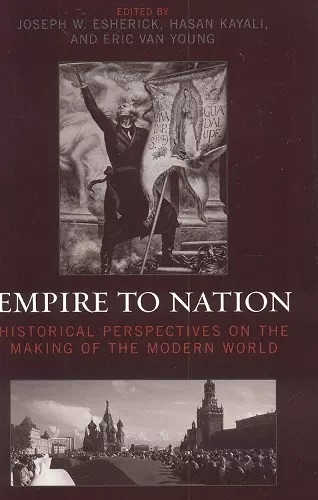Empire to Nation
Historical Perspectives on the Making of the Modern World
Joseph W Esherick editor Hasan Kayali editor Eric Van Young editor
Format:Paperback
Publisher:Bloomsbury Publishing PLC
Published:27th Apr '06
Currently unavailable, and unfortunately no date known when it will be back

The fall of empires and the rise of nation-states was a defining political transition in the making of the modern world. As United States imperialism becomes a popular focus of debate, we must understand how empire, the nineteenth century's dominant form of large-scale political organization, had disappeared by the end of the twentieth century. Here, ten prominent specialists discuss the empire-to-nation transition in comparative perspective. Chapters on Latin America, the Middle East, Eastern Europe, Russia, and China illustrate both the common features and the diversity of the transition. Questioning the sharpness of the break implied by the empire/nation binary, the contributors explore the many ways in which empires were often nation-like and nations behaved imperially. While previous studies have focused on the rise and fall of empires or on nationalism and the process of nation-building, this intriguing volume concentrates on the empire-to-nation transition itself. Understanding this transition allows us to better interpret the contemporary political order and new forms of global hegemony.
As this excellent collection shows, imperial collapses in the nineteenth and twentieth centuries in Europe (including the dissolution of the Soviet Union), Latin America, the Middle East, and East Asia have often left conflict-ridden legacies. Anyone interested in the forces that have shaped much of the modern world, and in many of today's major foreign policy issues, should read this book. -- Daniel Chirot, University of Washington
As the sun appears to set on empire, the authors in this valuable collection explore how imperial realms were imagined and why nation-states ultimately succeeded them. Rather than being an inevitable process, the end of empire took a variety of forms in Latin America, the Middle East, and the Soviet Union. It still persists elsewhere and may have an unpredicted future. For students of nationalism and its opponents, this book is a must-read. -- Ronald Grigor Suny, William H. Sewell Jr. Distinguished University Professor of History and Political Science, University of Michigan
In a positive revisionist analysis of the formation, growth, structure, and decline of the nineteenth- and twentieth-century empires (Ottoman, Habsburg, Chinese, Spanish, and Russian-Soviet), the authors of this original book prove that various ethnic, religious, and political features of these empires survived in the nation states that replaced them. Empire to Nation offers new perspectives for understanding the political phenomena of empires, nation-states, and nationalism in the era of globalization. -- Kemal Karpat, University of Wisconsin
This unique collection of essays examines the transition from empire to nation-state in the Spanish, Ottoman, Habsburg, Chinese, and Russian empires. . . . Those seeking better resources for teaching world history will be highly pleased with this anthology. Recommended. * Choice Reviews *
This book gets at one of the most intriguing and debatable processes in modern world history, the collapse of what we now call multinational empires and their replacement by different, usually smaller and often more contentious, states. The examples are chosen with wide geographical range, and the resulting comparisons are fascinating. -- Peter Stearns, George Mason University, Professor, George Mason University
ISBN: 9780742540316
Dimensions: 227mm x 163mm x 23mm
Weight: 562g
440 pages